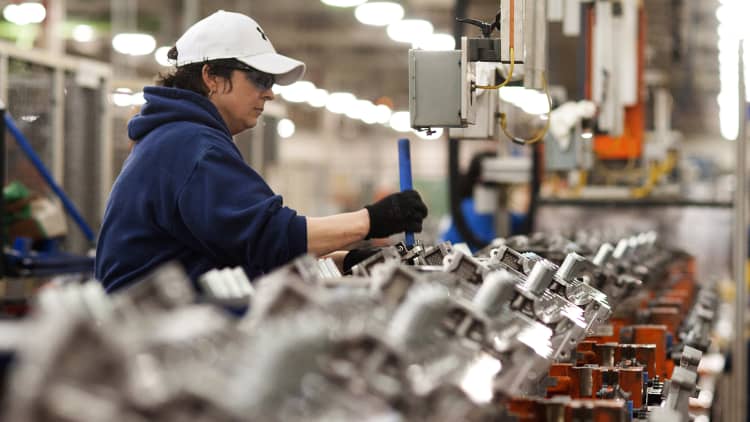
Hurricanes Harvey and Irma damaged not only Texas and Florida but also the U.S. jobs picture, as payrolls fell by 33,000 in September. That drop came even as the unemployment rate fell to a 16-year low of 4.2 percent, the Bureau of Labor Statistics reported Friday.
The jobs loss was the first monthly decline in seven years, when the economy was still pulling out of the Great Recession.
Even with the surprise jobs number, the closely watched hourly wages figure jumped higher, to an annualized rate of 2.9 percent.
Economists surveyed by Reuters expected payroll growth of 90,000 in September, compared with 169,000 in August. The unemployment rate was expected to hold steady at 4.4 percent. It declined even as the labor-force participation rate rose to 63.1 percent, its highest level all year and the best reading since March 2014.
"The lousy returns from the September jobs report will make little impression on observers, who essentially gave the labor market a free pass due to the impact of Hurricanes Harvey and Irma," said Curt Long, chief economist at the National Association of Federally Insured Credit Unions.
An alternate number that includes discouraged workers as well as those working part-time for economic reasons also tumbled, falling from 8.6 percent to 8.3 percent, its lowest reading since June 2007.
The number was expected to be lower than usual due to Hurricanes Harvey and Irma, which hammered Texas and Florida, respectively, as well as other states. Federal Reserve policymakers watch the report closely to help guide future policy, though this month's report may be treated as outlier due to the weather impact.
The storm's effects were obvious — eating and drinking establishments lost 105,000 positions as workers were laid off due to damage from the record-breaking hurricanes. Long said the wage gains also may be misrepresented as most of the jobs lost were in low-wage positions.
In addition to September's rough month, the July number was revised lower from 189,000 to 138,000 though August got a bump higher from 156,000. In all, though, 2017 thus far has seen the slowest jobs growth in at least five years.
Revisions will bear watching in coming months, as the final payrolls number comes from the Labor Department's byzantine estimation methods. The department's household survey showed the actual level of employed Americans grew by 906,000 while the unemployment rolls fell by 331,000. The report indicated a record 154.3 million Americans at work.
Job gains for the month came from health care, at 23,000, transportation and warehousing with 22,000 and professional and business services, which added 13,000.
Harvey and Irma's effects weren't all negative when it came to jobs — Wall Street-related finance positions grew by a net 10,000 thanks to an increase of 11,000 for insurance carriers and related activities. Credit-related services lost 7,000 positions.
Many economists already were prepared to dismiss the report due to the hurricanes. However, one number sure to garner attention was the wages pickup.
The BLS reported that average hourly earnings were up by 12 cents on the month to $26.55, equating to a 2.9 percent gain for the year. That's well above the 2 percent target the Federal Reserve sets for healthy inflation growth, meaning that the central bank is more likely to approve another interest rate hike at its December meeting.


